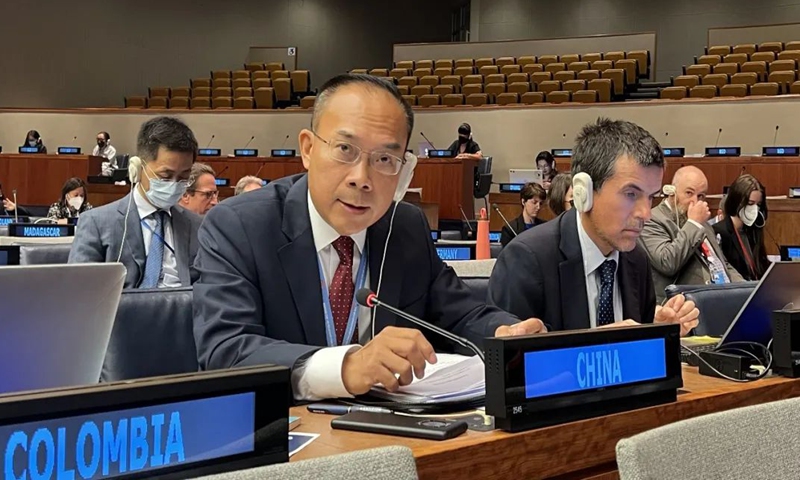
Li Song, Chinese ambassador for disarmament affairs
The trilateral cooperation on nuclear-powered submarines among the US, the UK and Australia (AUKUS) deals a heavy blow to the International Atomic Energy Agency (IAEA) safeguards system, poses severe risks of nuclear proliferation, and undermines regional peace and stability, Li Song, Chinese Ambassador for Disarmament Affairs, pointed out on Monday.
Li made the remarks at the general debate of the First Committee of the 77th Session of the UN General Assembly while introducing China's position and proposals as the world's non-proliferation mechanism is facing the severest challenge since the end of the Cold War.
Though the Cold War has been over for more than 30 years, the Cold War mentality remains the biggest threat to peace and stability of the world. At the moment, the global security structure and the international arms control, disarmament and non-proliferation mechanisms are facing the most severe challenge since the end of the Cold War, Li said in a statement.
Certain countries, driven by the Cold War mentality, have continuously instigated competition and confrontation among major countries, strengthened their military blocs, and have deliberately provoked and aggravated disagreements, he said.
"Such policies have been seriously undermining mutual trust among major countries, endangering global strategic balance and stability, and impeding the international arms control and disarmament process," Li said.
Li stated that mankind is an indivisible community of security. We must face up to and answer the question of our times: "What kind of security concept does the world need and how should all countries achieve common security?"
The envoy said the Global Security Initiative brought up by China advocates building a security structure that is balanced, effective and sustainable, aims to provide a Chinese solution for the long-term peace of the world through addressing security challenge with the mentality of pursuing mutual benefits and unity.
Elaborating on China's positions and proposals on the international arms control, disarmament and nonproliferation, Li said China doesn't participate into any forms of arms race. The fundamental responsibility of China's defense force is to safeguard its national sovereignty and territorial integrity and the arms control policy is to move forward a fair and reasonable process of multilateral arms control.
China is fulfilling its domestic legal procedures of Firearms Protocol. China is willing to further strengthen international communication and cooperation to make contributions for firearms control, Li noted.
The envoy said major countries, nuclear-armed states in particular, must abandon concepts of strategic competition and bloc confrontation, halt any pursuit of exclusive or absolute security, and stop putting their own security above that of others.
In January this year, leaders of five nuclear-weapon states — China, France, Russia, the UK and the US — issued a joint statement, stressing that a nuclear war cannot be won and must never be fought, and reaffirming that none of their nuclear weapons are targeted at each other or at any other state.
This historic statement is of great and far-reaching significance to preventing nuclear war and avoiding arms race, Li said, adding that the five nuclear-weapon states should further strengthen communication and collaboration and jointly uphold global strategic balance and stability."It is our hope that all nuclear-weapon states could respond positively to the repeated calls from UN Secretary-General Antonio Guterres and China to adopt the policy of no first use of nuclear weapons," he said.
Li stressed that the US should stop the development or deployment of regional or global missile defense systems, refrain from deploying land-based intermediate range missiles in Asia-Pacific and Europe, and must not duplicate the nuclear sharing arrangements in the Asia-Pacific region.
The trilateral cooperation on nuclear-powered submarines among the US, the UK and Australia (AUKUS) runs counter to the objective and purpose of the Treaty on the Non-Proliferation of Nuclear Weapons (NPT), deals a heavy blow to the IAEA safeguards system, poses severe risks of nuclear proliferation, and undermines regional peace and stability, the ambassador pointed out.
Li said that China has deep concerns with and strong opposition to such "cooperation." China calls on all members of the international community, especially the IAEA member states, to pay high attention to this issue, conduct thorough discussions and handle the issue with prudence, so as to preserve the integrity and effectiveness of the international nuclear non-proliferation efforts.
Global Times - Xinhua




